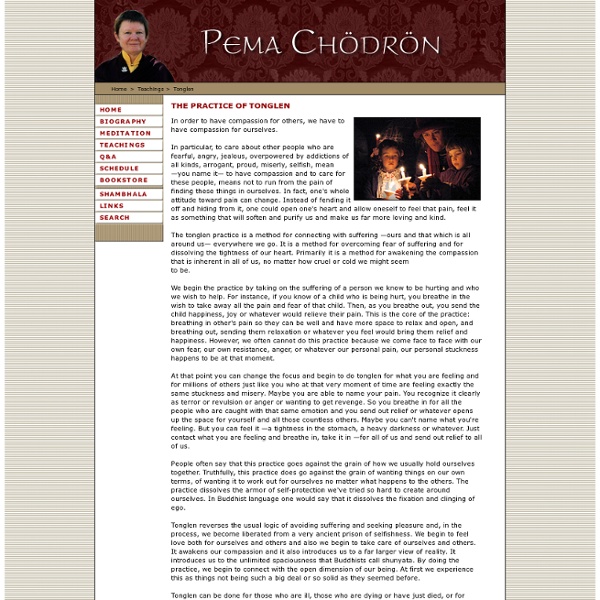Pema Chodron
In order to have compassion for others, we have to have compassion for ourselves. In particular, to care about other people who are fearful, angry, jealous, overpowered by addictions of all kinds, arrogant, proud, miserly, selfish, mean —you name it— to have compassion and to care for these people, means not to run from the pain of finding these things in ourselves. In fact, one's whole attitude toward pain can change. The tonglen practice is a method for connecting with suffering —ours and that which is all around us— everywhere we go. We begin the practice by taking on the suffering of a person we know to be hurting and who we wish to help. At that point you can change the focus and begin to do tonglen for what you are feeling and for millions of others just like you who at that very moment of time are feeling exactly the same stuckness and misery. People often say that this practice goes against the grain of how we usually hold ourselves together.
acim
For those students and visitors who find it electronically convenient and helpful to study and practice the Daily Lessons of A Course in Miracles, we're pleased to offer full Multimedia Lessons for you here on this site. Students can read each lesson online and/or listen to the lesson being read. The Workbook Lessons of A Course in Miracles (Text and Audio) can be accessed in two ways: 1. 2. An Introduction The introduction to the Workbook assures us that: "The exercises are very simple. As for the lessons themselves and this invitation to practice them, the introduction goes on to explain: "The purpose of the workbook is to train your mind in a systematic way to a different perception of everyone and everything in the world. In addition, a little faith in the process and in your inherent ability to understand and succeed will be helpful, but even that is not required if you are willing to seek the truth about yourself and the world, and the happiness that awaits you for your efforts.
Ask Me Anything Mondays: Taking Breaks
Ask Me Anything Mondays By Steven Pressfield | Published: February 10, 2014 Today, Lynn Barrett asks us … How do you know when you need a break? Steve: Are you asking me or yourself? Shawn: I’m asking you, and then I want to follow up because I have an idea, too. Steve: Okay. When in doubt, it’s Resistance. So, when you hear that voice in your head saying “Man, I need a break,” that’s Resistance in my opinion. I only take breaks when I’ve got real momentum going in a project. Shawn: I agree with you for the most part, especially the thing on once you’re giving it away for judgment. The only thing I would sort of, and I know you do this every day Steve, but I think a lot of people don’t, and that is: You know you need a break when you physically need a break. So, the one thing I would advise everyone, every day is get outside. Steve: That’s a good answer.
The Power of TED* » The Empowerment Dynamic: a Positive Approach to Life's Challenges
Related:
Related:



